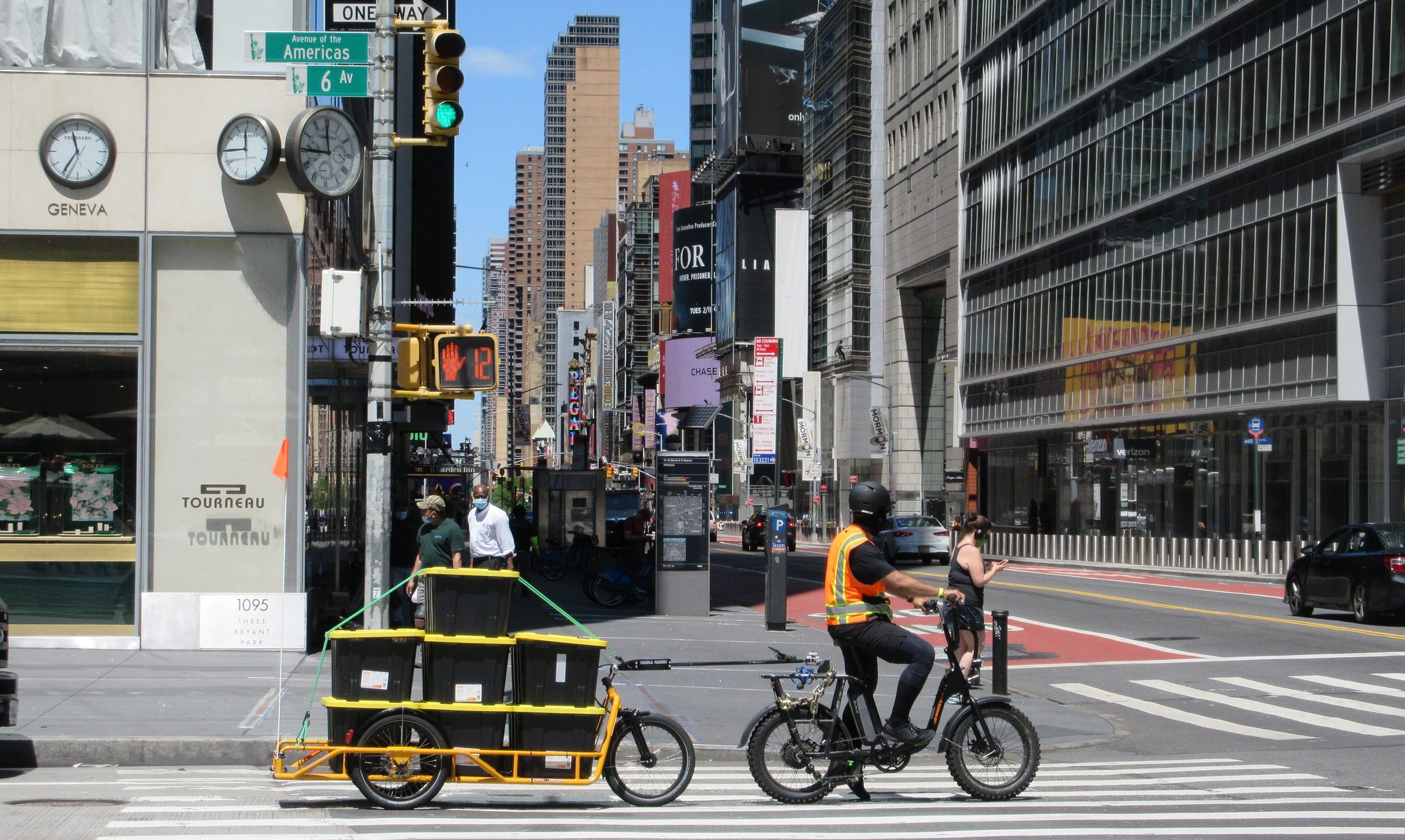Cargo bikes are cities' secret weapon against climate change, traffic violence, congestion, and more, a new paper argues — but getting more of these last-mile workhorses on the street will require a strategic approach that goes beyond basic bike-friendliness.
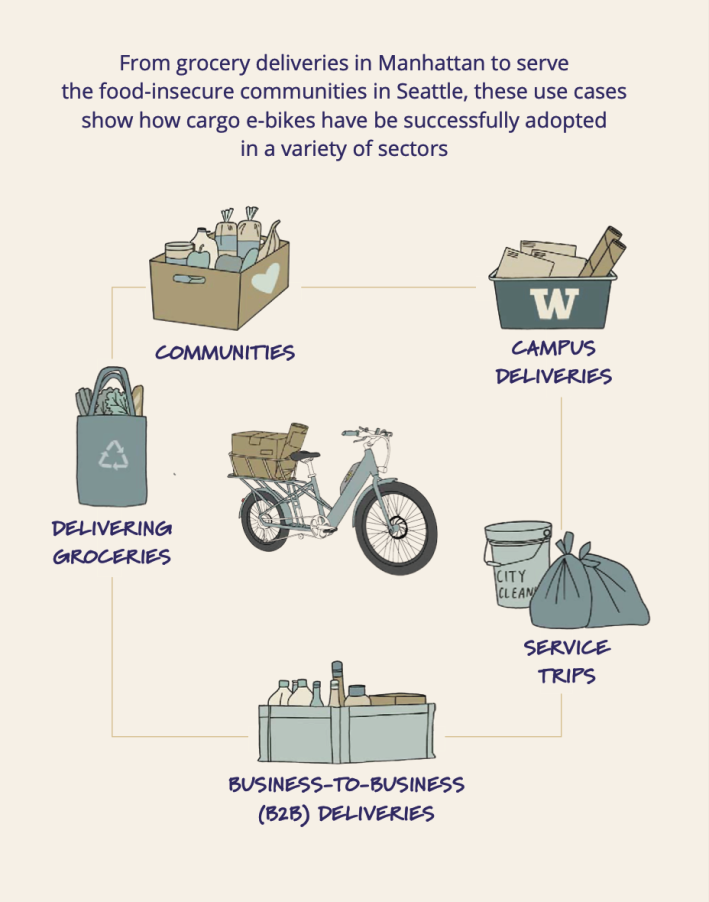
According to the University of Washington's Urban Freight Lab and nonprofit People for Bikes, cargo bikes could play a major role in greening the delivery sector, which is responsible for a staggering 28 percent of greenhouse gas emissions in cities worldwide. Ultra-heavy freight trucks and vans, meanwhile, are significantly more likely to kill any pedestrians and cyclists they might strike, in addition to blocking crosswalks and bike lanes, which can cause crashes with other vehicles.
Some groups have recognized the transformative potential of deliveries by cargo bike and trike, with college campuses, business-to-business corridors and grocery delivery outfits particularly embracing those modes. On the whole, though, the U.S. has been slow to embrace the micro-delivery revolution.
"There was a time when we thought cargo bikes were going to explode across North America, but then things kind of calmed down," said Giacomo Dalla Chiara, investigative lead at Urban Freight Lab and the author of the report. "So we thought, let’s bring everything together, and give [communities] a roadmap."
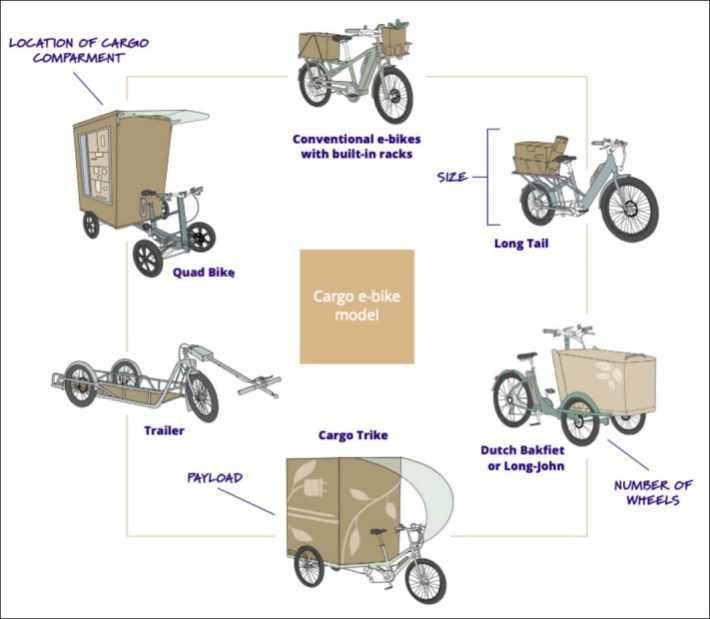
The report authors acknowledge that the core components of a good cargo bike strategy aren't fundamentally different from a good general bike plan, like creating better (and wider) bike infrastructure and broader policy definitions that literally and legally accommodate e-bikes of all sizes, while clearly delineating them from mopeds and other modes. Dr. Ash Lovell, the electric bicycle policy director for PeopleForBikes, cites America's lack of bike infrastructure as the primary reason why cargo bike delivery hasn't taken off in the U.S., even as it's flourished in Europe.
"E-cargo bikes can be so instrumental in reducing urban congestion and air pollution," added Lovell. "But if you don’t have safe and connecting infrastructure for delivery drivers to ride on, the chance is so much lower that businesses will use them."
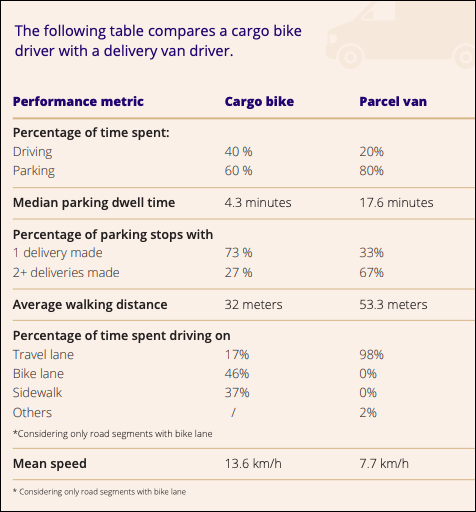
Commercial cycling requires cities to rethink other aspects of their built environment, too.
That includes reimagining their bike parking strategies, by allowing bigger bikes to park in automobile spaces, as well as building more-frequent curb cuts on sidewalks so cycles don't have to ride for long on pedestrian paths to reach their destinations. And the report authors ague that cities should think beyond the street, too, by establishing safe charging stations and rest areas for delivery drivers to recharge their bikes and their bodies.
Some cities may even need to make zoning reforms to make way for "microhubs," or car-light, miniature warehouses which allow vans and trucks to dump a cache of goods where they can be parceled out onto bikes for the last mile of their journey. Unlike traditional warehouses — which are often, rightly, barred from residential neighborhoods because they increase vehicle traffic and noise pollution — some microhubs can be as small as single parking space, and often constitute little more than a shipping container.
"There’s really no cargo bike delivery without microhubs," stresses Dalla Chiara. "Finding space for cargo bikes close to where they serve is so essential."
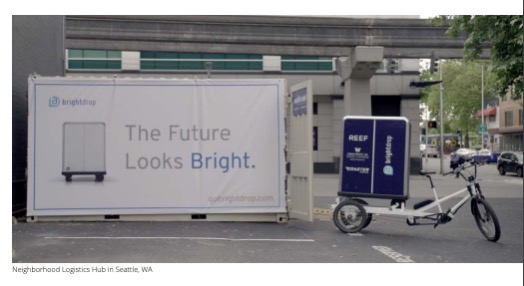
Even the best infrastructure and policy in the world, though, won't succeed without cultural change to match.
That's why the researchers recommended robust pilot programs to fine-tune delivery strategies, and make sure fleets blend seamlessly into neighborhoods and amongst other modes. Public awareness campaigns can also be helpful to educate business owners and residents on cargo bikes' benefits, as well as their unique safety concerns, like the importance of buying certified batteries to prevent building fires.
A Statement from Cargi B, NYC DOT's First Electric Pedal-Assist Cargo Bike
— NYC DOT (@NYC_DOT) May 31, 2023
"Now I like bike lanes, I like roadways, I like making street repairs
I like all of your cargo, get my keys, I’ll take you there
They call me Cargi Bardi, metal body, pedal mami, hot bike always” pic.twitter.com/ajsx40T1bU
Perhaps the fastest way to get residents up to speed on the pedal-assist revolution, though, is simply to make e-bikes and trikes a regular part of a daily life. That's why the report authors recommended more e-bike incentives and subsidies, like "green grants" for businesses to buy e-bikes of their own, or using public procurement processes to replace certain city maintenance vehicles like graffiti removal trucks with bikes.
Critically, the researchers recommended that e-bike incentives need to be offered to residents, too, even if they'll never use their vehicle to make a delivery themselves — and particularly if they're low-income.
"Whether it’s being used for commercial use or transportation or anything else, the more people who are riding, the more people who are going to support policies that support this mode," added Lovell.
The researchers emphasized that while e-cargo bikes will never replace automotive delivery outright, every freight truck we can subtract from the road counts — and in time, it may even help shift the status quo away from cars more broadly.
"Not everything will be delivered on bike; we’re not trying to say that," added Dalla Chiara. "But they can work together with bigger vehicles. ... We need to transition away from a car-focused transportation system, where every time I go shopping, I get in my car, and every time, I order something, it shows up in a delivery van."
